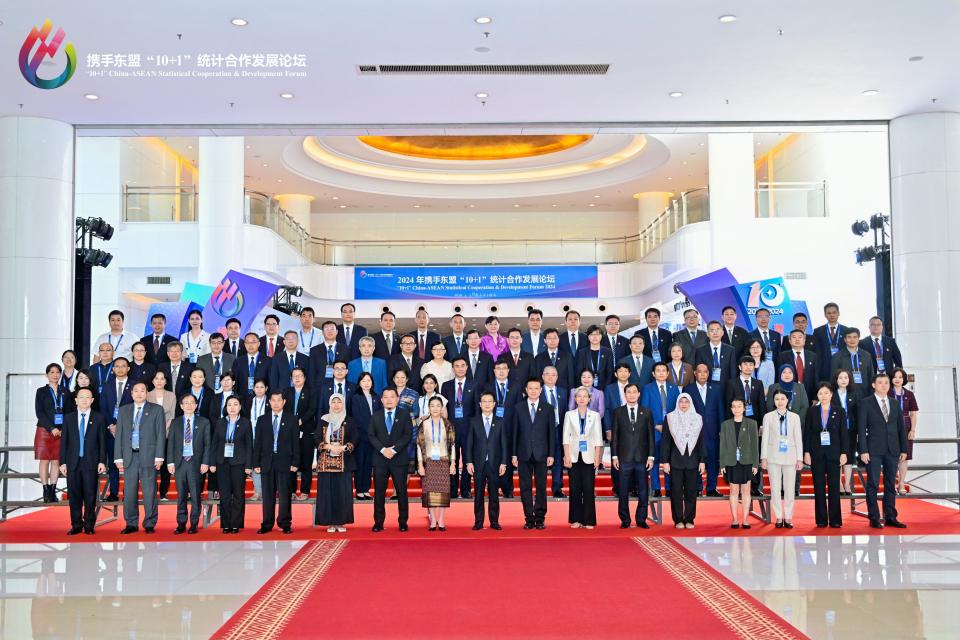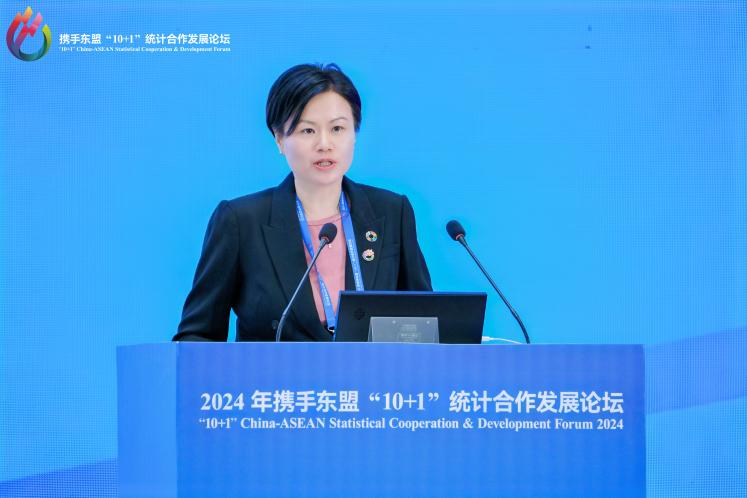Distinguished guests, esteemed colleagues, and participants,
It is my great pleasure to join you today at the 10+1 Statistical Cooperation and Development Forum. Nanning won my heart with its biodiversity and hospitality of its people.
As the Director of the United Nations University (UNU) Institute in Macau, please allow me to introduce you to the UN University, a global network committed to addressing global challenges through research, training, and education.
United Nations University: UNU is a UN organization and a UN think tank focusing on teaching, learning and policy-relevant research related to global pressing issues. UNU has 13 institutes in 12 countries, headquartered in Tokyo, and institutes spreading in Asia, Europe, north America and Africa. UN University will celebrate its 50th anniversary next year.
UNU Macau: UNU Macau is the only institute specialized in digital technologies and SDGs. Founded in 1992, the Institute was specialized in software technology in the early 90s, and digital governance since the 21st century. The Institute was referred to as the West Point of software technology by its alumni, thousands of researchers all over the world. Since 2016, the Institute has transformed its portfolio toward digital technologies and SDGs, in particular the governance of data and AI.
In today’s world, data is not just an asset — it is the foundation for effective decision-making, development, and governance. From mitigating climate change to enhancing public health and ensuring cybersecurity, data drives our ability to understand challenges, forecast risks, and take informed action.
As we convene at this forum to discuss statistical cooperation between China and ASEAN, we must remember the critical importance of data in guiding our collective journey toward achieving Sustainable Development Goals (SDGs). Data is central to the UNU’s mission, and our work at UNU Macau is pivotal in driving data innovation and fostering regional and global cooperation.

Citizen Cyber Resilience: The Smart City-zen Project
One of UNU Macau's highlight projects, the Citizen Cyber Resilience: Smart City-zen Project, exemplifies our commitment to using data and technology to strengthen the resilience of civil society. In an increasingly digital world, citizens and organizations are exposed to growing cyber risks. This project, supported by the Macau SAR government, is aimed at empowering individuals and civil society organizations to become more resilient in the face of these risks.
Through the development of the Smart Citizen Cyber Resilience Ontology (SC2RO) and extensive capacity-building workshops, this project equips stakeholders such as Caritas Macau, one of the largest local charities, with the tools they need to assess and manage their cyber risks. We have engaged over 40 civil society organizations in Macau, fostering greater awareness and enhancing their capacity to safeguard their digital resources. The outcomes of this initiative underscore the importance of empowering citizens to take an active role in enhancing their own cyber resilience, and the lessons learned are highly relevant for ASEAN countries as they continue to build their digital infrastructures and smart cities.
Insights from the 2023 World Data Forum Macau Satellite Event
In April 2023, UN DESA and the National Statistics Bureau of China organized in Hangzhou the World Data Forum. As the only UN organization in the Greater Bay Area of China, UNU Macau hosted the satellite event of the UN World Data Forum in Macau, which brought together 300 international experts, government officials and private sector to discuss the role of data in addressing global challenges. One of the key themes was the need to adopt a human-centered systems approach in managing data and digital technologies.
At the forum, participants highlighted three priorities: ensuring data privacy and security, fostering data inter-operability across borders, and bridging the digital divide that continues to affect equitable access to data. These challenges are especially significant in the Global South, where the rapid digital transformation often leaves vulnerable populations at risk of being left behind, leading to digital and data poor vs rich. The forum called fore partnerships across sectors to ensure data benefits everyone, not just a selected few.
Outcomes from the UNU Macau AI Conference
Earlier this year, UNU Macau hosted the UNU Macau AI Conference, which further explored how data and artificial intelligence can be harnessed to solve critical development challenges. The event underscored the need for ethical AI applications, particularly in education, healthcare, and public services.
Participants identified data scarcity as a key issue—despite the global explosion of data, many regions, including parts of ASEAN, still face difficulties in accessing the high-quality data necessary to power AI solutions. To address this concern, the plenary session launched the UNU Policy Guideline: Recommendations on the Use of Synthetic Data to Train AI Models. Do you know that 60% of the data to train AI systems is synthetically generated as soon as in 2024? Synthetic data implies both opportunities and risks for SDGs and our digital future. I highly encourage you to read the UNU policy recommendations on synthetic data to train AI algorithms.
UNU Macau AI conference concluded with a strong call for action for better data-sharing mechanisms, ethical frameworks, and inclusive AI policies. These are crucial for ensuring that AI technologies are not only innovative but also equitable and beneficial for all citizens. The outcomes from this conference hold significant relevance for ASEAN’s efforts to leverage AI for sustainable development and underscore the importance of data governance frameworks that protect the rights and interests of all stakeholders.
Also during the conference and in collaboration with UN DESA, we hosted a capacity-building workshop on data governance and digital transformation, inviting 30 ministers from global south countries to participate in the workshop.
We plan to host the next edition of the UNU Macau AI Conference on 24 October 2025. We warmly welcome all of you to join us in Macau.
In addition, during the AI conference, we launched the UNU Global AI Network, consisting of governments, academia, private sector and civil society. Nearly 100 members of the network meet regularly to exchange good practices on AI applications, and brainstorm on solutions to challenges such as AI governance, AI ethics and data and AI, among others.
I am also cordially inviting you all to join the UNU Global AI Network to contribute our collective intelligence to the UN discussions on AI, and co-creating a sustainable digital future for all.
UN Summit of the Future
Just last month, global leaders gathered in New York for the UN General Assembly and the Summit of the Future. Member states adopted the Pact for the Future, which includes a Global Digital Compact and a Declaration on Future Generations. As we examine these outcomes, it is clear that the responsible use of data and data as digital public goods will play a central role in shaping our collective future. For example, the Global Digital Compact aims to create a shared understanding of how digital technologies, including data, should be governed to maximize their benefits while minimizing risks.
At UNU Macau, we support the principles outlined in this compact, particularly those related to building trust, promoting open and inclusive data ecosystems, and ensuring that data governance frameworks reflect human rights, security, and sustainability.
The conversations we are having today, here at the “10+1” Statistical Cooperation & Development Forum, are a crucial part of this global dialogue. The role that ASEAN countries and China play in contributing to the development of ethical and inclusive data policies will be vital for the future of digital governance.
Toward the Future
As we look ahead, I would like to share several perspectives on enhancing data-driven development and cooperation:
- Foster Inclusive Data Ecosystems: The future of data lies in collaboration. We must build partnerships that ensure all stakeholders, including governments, civil society, and the private sector, have equitable access to data. The UNU Global AI Network is an example of our efforts to promote an inclusive and open ecosystem. And ASEAN and China can lead the way in promoting data collaboration that benefits all.
- Enhance Cyber Resilience: Strengthening cyber resilience is crucial for ensuring the security of digital infrastructures. The Smart City-zen Project demonstrates the importance of capacity-building initiatives, and similar efforts could be expanded across the Global South.
- Leverage AI Responsibly: AI holds great promise for solving regional challenges, but we must ensure that these technologies are used ethically and inclusively. The development of data-sharing frameworks needs to support ethical AI applications while respecting the privacy and rights of citizens.
- Strengthen Global Cooperation: As we face global challenges such as climate change and digital inequalities, it is essential to strengthen cooperation between countries, particularly within the Global South. By working together, China and ASEAN can set an example for how regional cooperation can lead to global solutions.
In closing, I would like to emphasize the critical importance of global cooperation in harnessing the power of data for sustainable development. The partnership between China and ASEAN is a model of what can be achieved when countries come together with a shared vision. By fostering an inclusive and resilient data ecosystem, we can ensure that data drives positive change, not only for our economies but also for the wellbeing of all citizens.
Finally, and I look forward to contributing to the discussions and collaborations that will emerge from this important forum.
Suggested citation: Jingbo Huang., "Harnessing Data for Sustainable Development," UNU Macau (blog), 2024-10-23, 2024, https://unu.edu/macau/blog-post/harnessing-data-sustainable-development.


